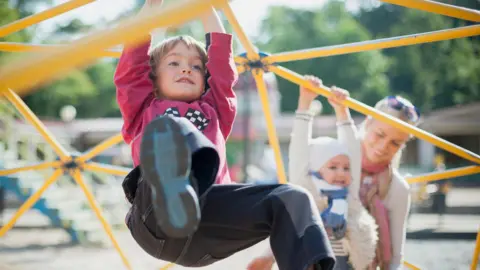'Anti-play culture' limits children's time outside
 Getty Images
Getty ImagesThe amount of time children spend outside has declined by 50% in a generation, a report has said.
The interim findings by the Raising the Nation Play Commission found children were spending less time outdoors as a result of a reduction in school break times, playground closures, safety concerns, and a lack of money for public play facilities.
Commission chair and Reading University chancellor Paul Lindley OBE said England had an "anti-play" culture and called on the government to tackle the issue.
A spokesperson for the Department for Education (DfE) said the government was "committed to making sure every child has the best start in life".
'Decimated opportunities'
"Play is absolutely vital to child development and to us as human beings," said Mr Lindley.
"It teaches us so many life skills... yet the opportunities for play have just been decimated over the last 15 years or so."
He said there were a multitude of reasons behind the decline, including the closure of playgrounds and youth centres, with 400 playgrounds closing across the country between 2012 and 2022.
He also said increased traffic, technology, and the use of "no ball games" signs could be behind the trend.
"Kids learn so many skills from play," he said.
"[They] are less healthy and less happy than they've ever been."
 Getty Images
Getty ImagesMr Lindley called on the government to "lead from the top" with the creation of a National Play Strategy for England.
The Commission also called for new DfE guidance to ring-fence playtime in the school day, as well as for school staff to be trained in the benefits of play.
The DfE spokesperson said: "Schools are best placed to develop and implement their behaviour policies as well as how to organise their school day.
"We are committed to making sure every child has the best start in life through our Plan for Change and working to ensure that all children and young people have access to a variety of enrichment opportunities at school."
You can follow BBC Berkshire on Facebook, X (Twitter), or Instagram.
